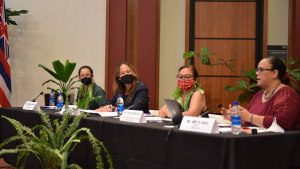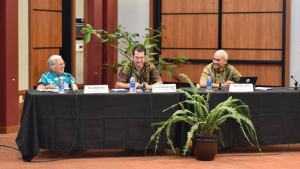
Three University of Hawaiʻi faculty members participated in two federal field hearings, convened by U.S. Senator Brian Schatz (D-Hawaiʻi), on the needs of the Native Hawaiian community and how the federal government can assist. Schatz is the Senate Committee on Indian Affairs chairman and held the hearings, titled “Upholding The Federal Trust Responsibility: Funding & Program Access For Innovation In The Native Hawaiian Community,” on June 1 at the East-West Center at UH Mānoa and on June 2 at the UH Hilo Ka Haka ʻUla O Keʻelikōlani College of Hawaiian Language.
Winona Kaalouahi Lee, the associate chair of the UH Mānoa John A. Burns School of Medicine (JABSOM) Department of Native Hawaiian Health, participated in the June 1 hearing, and UH Hilo Ka Haka ʻUla O Keʻelikōlani College of Hawaiian Language Director Keiki Kawaiʻaeʻa and UH Mānoa College of Tropical Agriculture and Human Resources Associate Researcher Noa Kekuewa Lincoln participated in the June 2 hearing.
“The federal government has a trust responsibility to Native Hawaiians—just like it does with American Indians and Alaska Natives—and that trust responsibility must be fulfilled,” said Schatz when he opened the hearings. “That is why we brought this conversation home—for the first time in more than a decade to hear about how this committee can seek equity for Native Hawaiians and support a thriving Native Hawaiian community.”
Lee focused on health disparities in her testimony, saying that Native Hawaiians have higher rates of diabetes, obesity, hypertension, substance abuse, depression and suicide compared to other ethnic groups in Hawaiʻi, and these problems were amplified by the COVID-19 pandemic.
“Access to quality and timely medical care for Native Hawaiians is challenging due in part to the severe physician shortage we face here in Hawaiʻi, as well as underrepresentation of Native Hawaiians in medicine and science,” said Lee during the hearing as part of a joint testimony with Joseph Keaweʻaimoku Kaholokula, the chair of the UH Mānoa JABSOM Department of Native Hawaiian Health. “Native Hawaiians make up only 4.5% of the physician workforce while comprising 21% of our general population.”

Among her comments, Kawaiʻaeʻa commended Schatz for introducing a bill to establish a federally funded Native American Language Resource Center.
“We lack the resources that such foreign language and area of study programs receive, including any of the 15 federally funded, national foreign language resource centers,” said Kawaiʻaeʻa during the hearing. “The lack of such support severely hampers our ability to reach the full potential of our various Native Hawaiian and Native American programs.”

Lincolnʻs testimony focused on agriculture, saying that Hawaiʻi was self-sufficient before Western contact and today, we are importing about 90% of our food supply.
“We rely on a just-in-time importation system, meaning that at any given point in time, we have about a 3-day supply of food in the state, putting us in a very precarious place in terms of disaster resilience and food security,” said Lincoln in his testimony, adding that the greatest barriers to Indigenous agriculture and food systems is access to land and water resources.
“We greatly appreciate Senator Schatz’s pioneering leadership of the Senate Committee on Indian Affairs, including by hosting two field hearings in Hawaiʻi with key UH leaders,” said UH President David Lassner. “We look forward to working together to continue to advance joint priorities at the federal level to improve the lives of Native Hawaiians in Hawaiʻi and beyond.”

